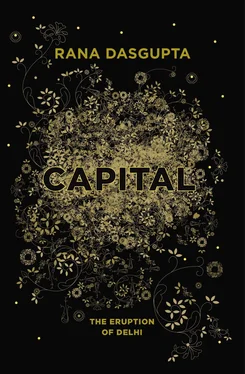It is dark now. Gautam plays old Hindi movie songs on his stereo.
“Don’t think he’s dishonest. It’s quite the opposite. He has a very strict code of ethics and for him it is the state that is corrupt. He won’t let himself be compromised by cheating policemen or tax officials. This unofficial economy — which is basically the entire economy round here — runs on a different moral system.
“But each year he pays more taxes,” he continues. “Because it’s getting difficult to function if you can’t show taxable income. The government knows there are lots of people like Pratap who earn 100 crores [$20 million] and declare only 15 lakhs [$30,000] to the tax authorities. But they are moving gradually: for now all they want is to get them into the system so they know who they are. Ten years ago they were totally invisible. Now they all have tax identification numbers and they file returns. It’s a big change.”
Ranjit is on another call. He is trying to change the timing of a flight to Nairobi. A battered bus overtakes us, its flanks festooned with the vomit tracks of passengers rattling inside.
The traffic bunches around a wedding procession and for a moment we are jammed up against the wedding band. Thirty trumpets resound in unison to the beat of big drums hammered with simultaneous passion and boredom, and the street is full of leaping men in suits, their shoulders shuttering, horned fingers aloft. Aloft on his white horse, the bridegroom looks curiously lonely. On the dark street the procession is a glaring island: uniformed men carry bright lamps on their shoulders, the wires trailing from one to the next. At the rear, a man wheels a cart on which a juddering diesel generator grinds out the power for all this illumination.
On the other side of the glass from my nose is the bare midriff of a dancing man whose shirt is hoisted high by his thrusting arms. Around the waistband of his bouncing boxer shorts is printed a brand name with no vowels: MYYTPPPS.
Forcing our way through the streets we arrive, finally, at a proud restaurant crowned with red neon signs. Pratap’s car pulls in ahead of us, and attendants, recognising him, jump to his assistance and ours. Both cars are whisked away by valets as we evacuate. We are in a red night glow. Above the entrance to the restaurant is an imposing statue of the god Hanuman. Behind his monkey head rises the moon, a quarter tonight. I think again, as I have so often, that no matter how many years I live in this place, I will never get used to that moon. I grew up with a moon propped up at a jaunty forty-five degrees. Here it lies on its back. The earth is round: we jut out from it at different angles to the sky.
We walk inside. Another statue of Hanuman greets us, garlanded with marigolds, but with this exception the restaurant has something of the feel of a strip club, with its parsimonious spot lighting and sweeping mirrored ceiling. The dining room itself is like a giant cavern, with tables stretching away — since the walls are black reflective glass — to apparent infinity. There are only men here: it is a businessman’s haunt.
We sit around a large round table: more people are expected. I sit between Ranjit and Pratap. Waiters bend their ears to Pratap, who orders whiskies for everyone. I have already been told that this is his show. It’s a tradition. He orders, he pays.
Ranjit is telling me about the first job he ever held.
“It was a lottery racket. Very sketchy. I worked for two brothers who had contacts inside the Nagaland state lottery. This was back in the 1990s. Every day they would pay 15 lakhs [then $50,000] to the lottery people to give them the last digit of the winning ticket before it was announced. Then they would buy up every single ticket ending with that number. We used to fan out all over India to get them. I used to cover Punjab and Haryana; I would take the 06.25 train to Jalandhar. When I arrived, I’d call my boss: ‘Which number should I buy?’ — ‘7’ — and I’d go to the market and buy every ticket ending in seven. Then I’d get on another train, go to Amritsar and do the same. And the same for all the cities. The tickets cost 10 rupees, and every ticket with the correct last number won 70 rupees, so they made 60 rupees on every ticket I bought. Tickets that had two or three numbers correct won 50,000 or a lakh. The winning ticket won 10 lakhs. So after all their bribes, salaries and expenses, my bosses earned profits of around 20 lakhs per day [then about $70,000]. It was crazy. We worked in a vast office where there was constant free booze and people were on the phone the whole time. Eventually one of the brothers was killed in Nagaland when he went to hand over a suitcase of cash. A terrorist organisation demanded his money, he refused to hand it over, and they shot him. The whole operation shut down straight away. But imagine how much money they made over three years. The surviving brother runs restaurants all over Delhi.”
“You should have seen Ranjit in those days,” says Gautam. “He used to earn lots of money, he wore expensive clothes, he had a nice car. He always had a full tank of petrol: you could say to him, ‘Let’s drive to the Himalayas,’ and we would just go. But he was very disturbed when that guy was shot.”
A tray of whisky arrives. Ranjit is irritated that this dinner has been arranged on a Tuesday, which is one of his non-drinking days. Drinks are distributed to everyone else: now we are seven or eight at the table. Their first gulp after the working day is greedy. They praise Ranjit’s abstention, however: “It is good to know you can do without it.” They tell astonishing stories of alcoholic addiction, whose spectre looms large for all of them. This leads naturally to chat of heart disease, diabetes and renal failure.
Pratap contributes nothing to these conversations. “I lost 60 lakhs [$120,000] today,” he says. “Can’t you all stop chattering?”
But no one takes any notice. The music is too loud in here for people to hear each other across the table, so they talk to those around them. Ranjit continues his account.
“I decided to look for a real job. I had been earning good money but I knew there was no future in it. When you’re doing something like that, you can’t say to anyone, ‘This is what I do.’ So I began to think about learning a real trade.”
“But you worked for that cable guy first.” Gautam laughs. “Ranjit was a hired thug.”
Ranjit is laughing too.
“That was when cable TV was just coming into Delhi. Every neighbourhood saw intense competition. I was employed by a cable operator to make sure no competitor came into his area. If they did, I would beat them up. I got into so many fights with that job. Once I was at a paan shop: a man came up and said, ‘Why are you standing here?’ and I said, ‘Who are you to ask me why I’m standing here?’ and three of us started beating him up. We only realised afterwards he was a policeman, and suddenly the police were all over the neighbourhood, beating people up to find out who had done it. We had to flee town.”
Ranjit is a quiet man. It is difficult to imagine that his modest physique might be capable of such exploits.
“I had a friend who worked for a travel agency and he told me there were good prospects in travel. So I got a job with a travel agency. My salary was 1,300 rupees [then $42] a month. Before that, at the lottery, I used to earn 30,000 rupees [then $1,000] a month. But I wanted to learn something respectable. For the first six months I worked as an office assistant, serving water, making coffee, washing plates. Then I spent six months as the office runner, delivering tickets to customers. Then I worked in their courier business: I would accompany large loads to Bahrain, Abu Dhabi or Moscow. When I went to Bahrain I would leave on Saturday night with a thousand-rupee allowance and $50 for a Bahrain visa. But I didn’t want to spend the $50 on the visa, so I would stay in the airport for two days until the return flight on Monday night. I would just sleep for two days.
Читать дальше











